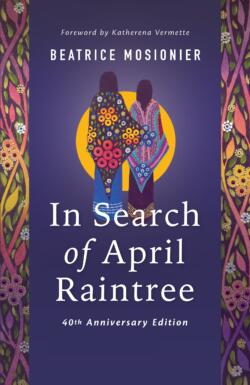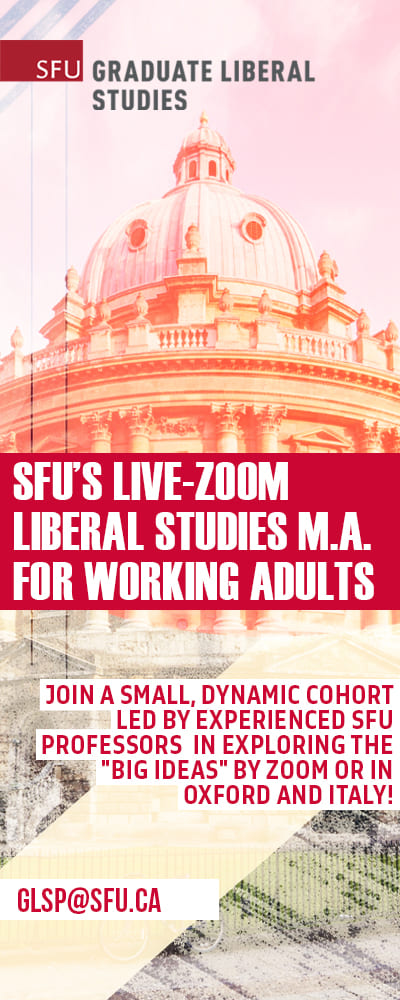1960 ‘[T]ender and brutal … heartbreaking and hopeful’
In Search of April Raintree (Fortieth Anniversary Edition)
by Beatrice Mosionier
Winnipeg: HighWater Press, 2023
$22.95 / 9781774920916
Reviewed by Brett Josef Grubisic
*
 To familiarize myself with In Search of April Raintree, a book a publicist had kindly sent to me that also revealed a surprise gap in my reading history, I first read about Beatrice Mosionier’s debut novel.
To familiarize myself with In Search of April Raintree, a book a publicist had kindly sent to me that also revealed a surprise gap in my reading history, I first read about Beatrice Mosionier’s debut novel.
A few articles later, I knew the next author on my schedule.
Regarding In Search of April Raintree, NDP MLA Nahanni Fontaine remembers its singular impact, “Reading Beatrice Mosionier’s seminal novel was life changing. As a young Indigenous woman, it was the first time I felt seen.” As does CBC broadcaster Rosanna Deerchild: “I could feel it in my blood memory. Because it was tender and brutal, authentic and unapologetic, heartbreaking, and hopeful.”

In the newest edition of the novel, which was first published in 1983, celebrated Winnipeg author katherena vermette recalls library visits as a kid, where she checked out Wuthering Heights and Gone with the Wind. She was shocked in a pleasant way to find In Search of April Raintree: “The thing is, and this is sad, but in all that reading I did, I never even expected a book to be about someone like me. I never thought Winnipeg and Métis or other Indigenous people at all would ever be in a book, never mind an important one.”
In thanking Mosionier, vermette adds: “She told the story she wanted to see in the world, and when it was published, the world leaned in to listen. She made it for everyone—to show those who didn’t know what it was like, and to show those of us who did know that our stories can and should be written, too.”
In the new edition’s afterword, Saskatchewan professor Raven Sinclair likewise remembers the first time she encountered the novel. At the time she was a part-time student at the University of Toronto. Relating “keenly and heartbreakingly to the isolation, loss, loneliness, and fear” that confronts the protagonist, Sinclair describes Raintree as a “source of great comfort” and an example of an invaluable literary work that “reflects the lived experience of child welfare that affected several generations in all our families, and it had a profound effect on so many.”

Interviewed in Windspeaker, Mosionier, now in her seventies and a North Okanagan resident, explains the autobiographical facets of a novel she began to compose in her early thirties and how writing helped raise her consciousness: “I did get more understandings about the why and everything. Because when I grew up, we didn’t know words like ‘oppression’ and ‘racism’ and all the things like that when we’re in school… We knew people don’t like us, but we don’t know why it could be. You know, because we’re brownish and because we’re foster kids.”
While readers familiar with the novel might immerse themselves once again in Mosionier’s disturbing and remarkable portrayal of Canada between 1955-1972, new readers will be introduced to the challenging experiences, indomitable voice, and slow but gratifying personal evolution of April Raintree.
Her narration opens in spring with April feeling ruminative after a recent birthday celebration. Now 24 and feeling old beyond her years, she recalls Cheryl, her younger sister, as well as Henry, her father (“a little if this, a little of that, and a whole lot of Indian”) and Alice her “part Irish, part Ojibway” mother. The family left a small Manitoba town for Winnipeg, for medical treatment of Henry’s tuberculosis.
In the city April discovers racism, in the form of school bullies, and the state in the form of police and social workers, who send the sisters “off into the unknown” when Henry and Alice’s severe alcoholism renders them incapable for caring for April and Cheryl.
Initially, this unknown is an orphanage run by strange stern women April learns to call “nuns.” She and Cheryl wind up in foster homes and communicate via letters. The Raintrees reunite on occasion and the girl soon hear that their parents cannot take them back. Henry and Alice gradually disappear altogether from April’s life.
Before April can exclaim “I was free, free! FREE!” (and moments later humorously confide, “I found freedom rather boring”), she endures years as a foster child at a farm whose heartless owners educate their ward about the society’s cruelty, prejudice, and indifference. April discovers a talent for perseverance too.
Between hardships at home and school, she envisions herself outsmarting the status quo by renaming herself April Raintry, assimilating herself into white society, and finding “perfection personified” and marrying him. (At school she’s been given a stern warning about “Native girl syndrome,” with its apparent fates of alcoholism, promiscuity, and skid row; she’s eager to avoid that supposed condition.)
Newly independent and employed as a waitress and then a legal secretary, April continues to embrace “magazines and … daydreams.” When granted a dream come true—romance, sudden marriage, a mansion in Toronto—she scarcely hesitates. In part too, she’s in flight from shame and the bleak scenes she’s witnessed in Winnipeg—slum lodgings, widespread alcoholism, and what she deems “gutter-creatures”—that she understands as lessons about the value of assimilation in a society whose systems devalue people like her.
April views Cheryl’s outspoken racial pride as “so religiously Métis” and, for a time, can see no value in her family’s heritage.
As one dream reveals itself as a mirage, though, April recounts a return to Winnipeg, where revelations about Cheryl (that are radically different from what Cheryl revealed in her letters) and further experiences (including a sexual assault and suicide) teach April about the caustic outlook beneath her optimistic, can-do attitude. “I had learned to hate,” she confides, “a real, cold, deep hatred had crept into me, and I knew I wouldn’t want to let go of it, not for the rest of my life.”
Told by Cheryl that she’s a bigot against her own people, April’s ongoing journey of self-discovery, which doubles as a political awakening, closes with terrible losses and unexpected gains. A plainspoken and magnetic narrator, April treads forward, enlightened but wary and sure-footed despite her doubts. As crafted by Mosionier, April’s history shines a light on a place and its iniquities; and it exposes a citizenry, composed of the kindhearted and cruel, whose own journey to civility is far from complete.
*

My Two-Faced Luck, the fifth novel by Salt Spring Islander Brett Josef Grubisic, published in 2021 with Now or Never Publishing, is reviewed here by Geoffrey Morrison. A previous book, Oldness; or, the Last-Ditch Efforts of Marcus O (2018), was reviewed by Dustin Cole. [Editor’s note: Brett Josef Grubisic has recently reviewed books by Hazel Jane Plante, Sam Wiebe, Joseph Kakwinokanasum, Chelene Knight, Lyndsie Bourgon, Gurjinder Basran, and Don LePan for BCR.]
*
The British Columbia Review
Interim Editors, 2023-24: Trevor Marc Hughes (non-fiction), Brett Josef Grubisic (fiction)
Publisher: Richard Mackie
Formerly The Ormsby Review, The British Columbia Review is an on-line book review and journal service for BC writers and readers. The Advisory Board now consists of Jean Barman, Wade Davis, Robin Fisher, Barry Gough, Hugh Johnston, Kathy Mezei, Patricia Roy, Maria Tippett, and Graeme Wynn. Provincial Government Patron (since September 2018): Creative BC. Honorary Patron: Yosef Wosk. Scholarly Patron: SFU Graduate Liberal Studies. The British Columbia Review was founded in 2016 by Richard Mackie and Alan Twigg.
“Only connect.” – E.M. Forster































5 comments on “1960 ‘[T]ender and brutal … heartbreaking and hopeful’”